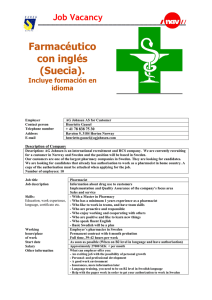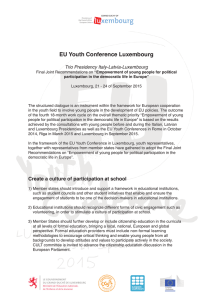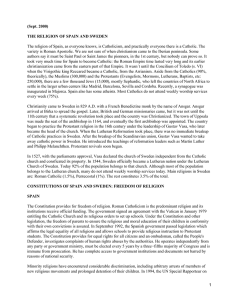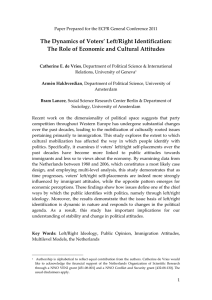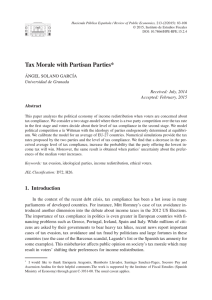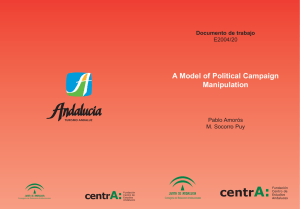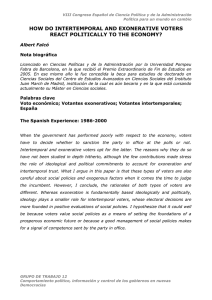Data Analysis
Anuncio
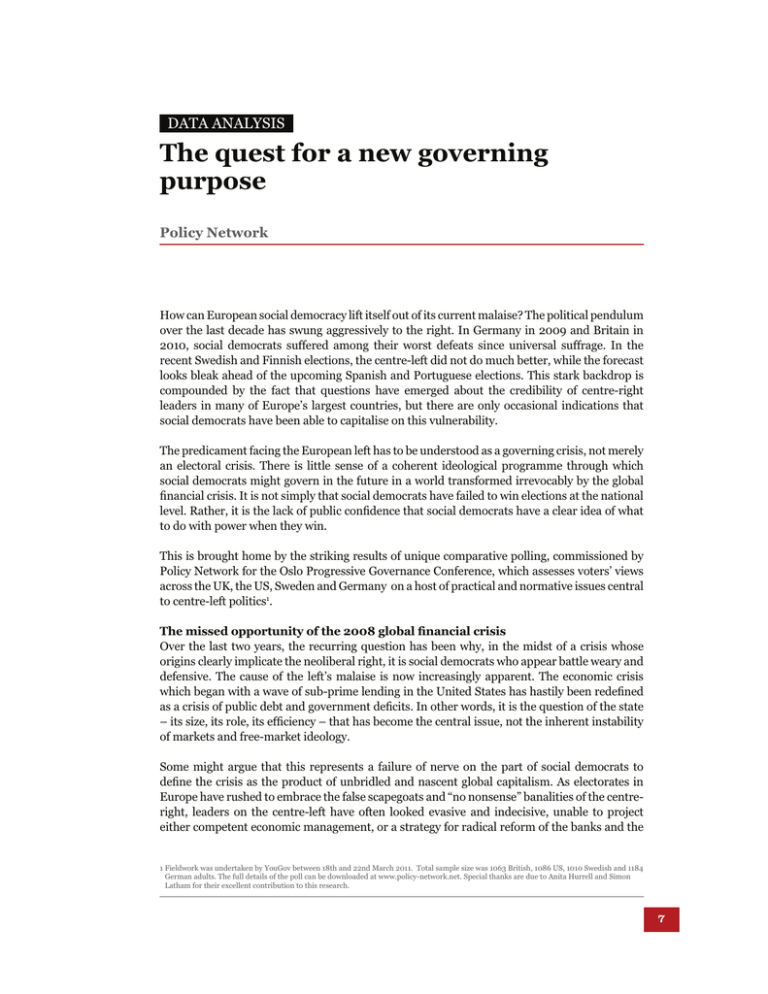
DATA ANALYSIS The quest for a new governing purpose Policy Network How can European social democracy lift itself out of its current malaise? The political pendulum over the last decade has swung aggressively to the right. In Germany in 2009 and Britain in 2010, social democrats suffered among their worst defeats since universal suffrage. In the recent Swedish and Finnish elections, the centre-left did not do much better, while the forecast looks bleak ahead of the upcoming Spanish and Portuguese elections. This stark backdrop is compounded by the fact that questions have emerged about the credibility of centre-right leaders in many of Europe’s largest countries, but there are only occasional indications that social democrats have been able to capitalise on this vulnerability. The predicament facing the European left has to be understood as a governing crisis, not merely an electoral crisis. There is little sense of a coherent ideological programme through which social democrats might govern in the future in a world transformed irrevocably by the global financial crisis. It is not simply that social democrats have failed to win elections at the national level. Rather, it is the lack of public confidence that social democrats have a clear idea of what to do with power when they win. This is brought home by the striking results of unique comparative polling, commissioned by Policy Network for the Oslo Progressive Governance Conference, which assesses voters’ views across the UK, the US, Sweden and Germany on a host of practical and normative issues central to centre-left politics1. The missed opportunity of the 2008 global financial crisis Over the last two years, the recurring question has been why, in the midst of a crisis whose origins clearly implicate the neoliberal right, it is social democrats who appear battle weary and defensive. The cause of the left’s malaise is now increasingly apparent. The economic crisis which began with a wave of sub-prime lending in the United States has hastily been redefined as a crisis of public debt and government deficits. In other words, it is the question of the state – its size, its role, its efficiency – that has become the central issue, not the inherent instability of markets and free-market ideology. Some might argue that this represents a failure of nerve on the part of social democrats to define the crisis as the product of unbridled and nascent global capitalism. As electorates in Europe have rushed to embrace the false scapegoats and “no nonsense” banalities of the centreright, leaders on the centre-left have often looked evasive and indecisive, unable to project either competent economic management, or a strategy for radical reform of the banks and the 1 Fieldwork was undertaken by YouGov between 18th and 22nd March 2011. Total sample size was 1063 British, 1086 US, 1010 Swedish and 1184 German adults. The full details of the poll can be downloaded at www.policy-network.net. Special thanks are due to Anita Hurrell and Simon Latham for their excellent contribution to this research. 7 Progressive Governance, Oslo 2011 global financial system in the vein of the Keynesianism and New Deal of the 1930s. History may conclude that the centre-left squandered a moment of unique opportunity. In truth, however, many of the guiding assumptions of the prevailing pre-crisis social democratic governing model were shattered well before the onset of the crisis in 2007-8. New growth theory presupposed that investment in human capital would lift all boats. Despite the new opportunities created, the opposite has been the case for the “squeezed middle”, as wage stagnation and declining living standards have afflicted large sections of blue and white-collar workers. Centre-left governments assumed a benign marriage of economic efficiency and social justice, investing the proceeds of growth from increased global market competition into the welfare state and public services. What followed was runaway wealth and income inequality that post-hoc redistribution could not possibly contain. Coming to terms with the dilemmas of governing The capacity of social democrats to seize the aftermath of the crisis and redefine it as the basis for a resurgent, radical progressive politics has to involve coming to terms with the dilemmas of governing. There is simply no substitute for hard thinking and engagement with uncomfortable realities and the structural challenges we face. This is a precondition for becoming a serious contender for power. Policy Network’s recent study, Southern Discomfort Again, which examines the UK Labour party’s fractured electoral base, exposes the weakness of the centre-left in the key areas of economic competence and the politics of identity. This analysis is furthered and reinforced by the new international research underpinning the present publication. At the heart of it lies the question of trust: in state action, in the market economy, and in the opportunities provided by the workplace. Trust is undoubtedly the single most important source of capital in politics. Faced with frighteningly low levels of trust in the state and the market, with widespread concerns about government redistribution and the role of corporations, as well as a high degree of cynicism towards the ruling elite (of which social democratic parties are now seen to be part), social democrats seem to be on the back foot like no other political contender. Indeed, like no other political ideology, social democracy has – at least up to now – heavily depended on the levers of both state and market power to deliver its promise of shared prosperity. From this perspective, the critical verdict on centre-left parties and their political offer should not come as a great surprise. The following findings expose the depth of the social democratic predicament which must be tackled. 1. People are palpably frightened by the concentration of power in the market economy; yet the democratic deficit of the economic realm is mirrored by a lack of faith that the state and practice of politics can reflect the public interest. Unease about concentrations of power is most visible in people’s apprehensiveness about the dominance and practices of large, typically multinational, corporations in our societies. Majorities in the UK (85%), Germany (83%), the US (69%) and Sweden (60%) agree that large corporations care only about profits and not about the wider community or the environment. This perception is more common among social democrat voters, with a notable 30-point divergence between Democrat and Republican voters in the US. The perceived domination of the market economy by large corporations that squeeze out small 8 The quest for a new governing purpose firms is seen in all four countries and by voters of all parties as the principal disadvantage of the market economy. This seems to suggest a move in Europe towards the American tradition of progressive populism, where standing up for the “little man” (and woman) against “special interests” has had strong political purchase. But if there is a need to democratise the economy, there is an equally pressing imperative to restore faith in the democratic legitimacy of political decision-making. In the contest between vested interests and the public interest, all too often people believe that they are losing out to the agendas of individual companies, politicians and lobbyists. Thus, people have a very low estimation of government’s ability to stand up to vested interests – ranging from a mere 15% in the US, 16% in the UK and 21% in Germany, to a more respectable but still worrying 27% in Sweden – when asked to compare the different strengths of state action. Moreover, the extent to which the state is hijacked by these vested interests is a matter of utmost concern to voters, especially in Germany (48%) and the US (47%). In the UK this perception is slightly less widespread (38%), while Swedish voters again are the least pessimistic (17%). Concern over corporate power Q. Big companies these days care only about profits - not about the wider community or environment. Agree 100 Disagree Percentage 80 60 40 20 0 Britain United States Sweden Germany This feeds significant scepticism about the efficacy of state action: significant numbers in the US (39%), the UK (29%) and Germany (27%) question whether there are, in fact, any advantages at all to government-led action to improve our societies, in contrast to a more optimistic view in Sweden (just 8%). Whereas in Sweden and Germany representing the democratic will of the people is viewed by at least a third of voters as the principal advantage of government action, US and UK voters are much more cynical about the capacity of politicians to represent their interests (with just 14 and 17% respectively citing this as an advantage). 2. Voters still see the advantages of the liberal, competitive functions of the market, but faith in the market economy’s capacity to deliver other social goods – principally jobs and shared wealth – is at a low ebb; without reasserting the state’s role in making the market work for all, confidence in the social market economy will remain fragile. Voters value competition in the market because it keeps prices down and provides consumers with a wide choice of goods and services. Competition is cited by voters as the primary advantage 9 Progressive Governance, Oslo 2011 of a market economy in the UK (50%), the US (45%) and Sweden (52%), while in Germany it also very important to voters (45%). The wide choice of goods and services that the market economy provides is highly valued by 44% of voters in the UK, US and Sweden, and 53% in Germany. It is apparent that people would be unwilling to see these advantages diminished or traded in. However, voters are concerned by the harsh impact the market often has on vulnerable individuals – cited by 41% in Sweden, 29% both in the UK and Germany, and 20% in the US as one of the major disadvantages of the market economy. Moreover, positive effects of the market on jobs and opportunities do not feature highly: while in the US 35% highlight the contribution that the market makes to employment prospects, under a quarter emphasise this as an advantage in Sweden (24%) and the UK (21%), and only 15% in Germany. This suggests social democrats have to be much clearer in setting out how their support for the market economy and policies to generate growth will result in jobs and opportunities, in particular, for the “squeezed middle”. At the same time, voters do not regard the state as powerless in the face of increasingly globalised markets; this suggests voters still believe government can and should create mechanisms of intervention to protect citizens. Even while debate rages in the US about outsourcing and offshoring jobs, only 8% express the view that the state is powerless in an open economy. The task of ensuring that the market economy provides tangible social goods therefore hinges upon the effectiveness of the state in delivering change through its institutions. Yet this will be made all the more difficult by voters’ negative assessment of the levels of bureaucracy and inefficiency which presently hinder state action. This is a central concern across all four countries, cited by 45% in the US, 44% in Sweden, 41% in Germany, and 40% in the UK as one of the major disadvantages of government action. Social democrats need to come to terms with how the state reforms itself; crucial here will be to guard against mitigating the trade-off required between, on the one hand, harnessing the liberal advantages of the market, and, on the other, fostering a more sophisticated form of state interventionism to reassert the social dimension to the market economy. 3. Non-social democratic voters believe centre-left governments tax too much with too little public benefit; social democrat voters, however, are more accepting of the role of taxation. Overall, pluralities in all four countries believe that centre-left governments tax too much with too little public benefit – 39% in the UK, 46% in the US, 34% in Sweden, 48% in Germany. In marked contrast, centre-left voters are much more positive about the effectiveness of the taxand-spend political economy pursued by centre-left governments – only 12% of Democrat voters in the US, 9% of Labour voters and 6% of Swedish social democrat voters agree that these parties’ expenditure in government does not lead to tangible public benefits. Even German SPD voters believe this to be the case – 23%. The task of persuading non-social democratic voters of our administrative competence is daunting: in the US, 89% of Republican voters agree with the notion that centre-left expenditure is too high relative to outcomes for the public at large; in the United Kingdom, even 30% of supposedly “progressive” Liberal Democrat voters and 68% of Conservatives agree with this; in Germany, 66% of people who voted for the ruling CDU party and 22% of people who support the increasingly popular Green party also subscribe to this view. 10 The quest for a new governing purpose The politics of taxation Q. Percentage of people who agree that social democratic governments tax too much with too little public benefit. General public 100 Social democrat supporters Percentage 80 60 40 20 0 Britain United States Sweden Germany Yet there is support among voters of other parties for increased taxation, but only provided it would be guaranteed to improve benefits and services. In the UK, 51% of Liberal Democrat and 32% of Conservative voters appear supportive of this. This trend is borne out in Germany, where 47% of people who support the incumbent CDU and 41% who support the economically liberal FDP would also be supportive, while in Sweden this is the case among 37% of voters for the Moderate party, which has made so many gains by adopting key tenets of their opponents’ social democratic agenda. Even in the US, 17% of Republican voters would tolerate increased taxes subject to the guarantee that extra revenue would be used to improve healthcare, increase pensions and provide more money to schools. This suggests that this issue does not necessarily relate to support for taxation per se but how people feel their taxes are spent. 4. Despite social democrats’ move towards social investment strategies, it is evident that people are still attached to an old-style welfare state which prioritises late-age redistribution and job security above all else Job security remains people’s absolute priority. This is the case in the UK, Germany and the US, and even in Sweden, where social investment strategies have been furthest developed, job security is still a crucial concern. People are unwilling to trade this in; there has been at best a lukewarm response to alternative strategies to boost their employment, including through improved training and career development opportunities. Across all four countries, only between 13 and 16% of people would accept less job security for improved training. There is also a strong attachment to the pillars of the postwar welfare state, including public pension provision, healthcare and even – to a lesser extent – unemployment benefits. People seem to be unpersuaded by arguments that social spending should be in future concentrated on investment in early-age intervention to bring about long-term change. When asked which of the three areas they would find most acceptable to cut in the interests of spending more on nurseries, early-years schooling and financial support for families with young children, significant numbers would be unwilling to cut any (60% in Germany, 52% in Sweden, 49% in the United States and 34% in the United Kingdom). And very few would be willing to cut pensions or healthcare. 11 Progressive Governance, Oslo 2011 The primacy of job security Q. Suppose you could have two of the following – but in return you would have to accept less job security (that is, a higher probability that you could lose your job), which, if any, would you choose? United States Britain 9 4 5 8 10 35 39 14 13 14 18 31 34 21 22 14 Sweden 9 6 A greater voice in my employer’s decision-making Germany 27 9 A stronger social security safety net e.g. higher cash benefits if I am unemployed 6 39 9 25 15 Improved training and career development opportunities Financial bonus/share in profits if my organisation does well A better work-life balance 29 Higher basic pay 16 23 20 21 27 12 None - job security matters more to me than any of these benefits Don't know 5. People’s pessimism about the reality of equal opportunities confronts social democrats – as the traditional champions of social progress and mobility – with a particularly acute political challenge, especially among men and our own voters. Today, most people believe that who you know is usually more important for getting on in life than hard work and playing by the rules. This sentiment is most pronounced in the United Kingdom (62%) followed by Sweden (56%) and then Germany (54%). In the US this feeling is somewhat weaker (46%), suggesting that belief in the “American dream” persists to some degree. Significantly, it is the centre-left’s constituencies that seem to be most affected by this pessimism. Democrat voters in the US are substantially less optimistic about opportunity than Republicans, with a 10-point divergence evident. In the UK, Labour voters, too, have a significantly more negative perception of opportunity than Conservative voters (67% compared to 57%). 12 The quest for a new governing purpose Pessimism about opportunity Q. Who you know is usually more important for getting on in life than hard work and playing by the rules. Agree 100 Disagree Percentage 80 60 40 20 0 Britain United States Sweden Germany Furthermore, at its heart, this malaise seems to be a predominantly male phenomenon. European men are substantially more pessimistic about opportunity than women. In the UK, 67% of men agree that who you know is more important than hard work compared to 58% of women. This is mirrored in Sweden (61% of men compared to 51% of women) and in Germany (59% of men compared to 49% of women). In the US, a similar effect is apparent but is negligible (48% of men compared to 45% of women). 6. Social democrats have pursued education policies which presuppose that university degrees, accessible to as many school leavers as possible, are a pathway to employment and prosperity in a knowledge economy; a majority of voters, however, think they raise career expectations which ultimately cannot be fulfilled. In the UK, Germany and, to a lesser extent, the US, pessimism about the current value of a university education is rampant. Scepticism is most prevalent in the UK (79%), followed by Germany (66%), and the US (57%). Sweden, however, offers an alternative picture with only 28% of voters questioning the worth of further education and 37% holding the opposite view. The older people get, the more likely they are to believe a university degree today is not useful. The important exception here, however, is the UK, where one group, those aged between 18 and 24, display a distinctly negative perception of the current value of a university education. This reflects anxiety about entrenched levels of youth unemployment, as well as fears that increasing numbers of recent graduates will become part of a “lost”, workless generation, fears which are likely to be further exacerbated in other European countries. 13 Progressive Governance, Oslo 2011 The broken promise of education? Q. University degrees are less useful than they used to be. Today a university education often raises career expectations that cannot be fulfilled. Agree 100 Disagree Percentage 80 60 40 20 0 Britain United States Sweden Germany However, it is notable that social democrat voters are, today, overall more positive than others about the opportunities offered by a university education. In part, this may be explained by the fact that access to higher education has widened significantly in many countries, not least the UK. This has opened up opportunities for people from different social backgrounds to attend university. Yet, social democrats need to come to terms with the realities of the opportunities available in a globalised labour market and the need to concentrate on skills, education and training policy with a wider focus than just higher education. A post-crisis agenda for centre-left politics Coming to terms with these and other multifaceted dilemmas of governing is a tall order. It requires social democrats to radically rethink their political programme and present a credible alternative to the prevalent socio-economic discourse offered by an increasingly unsettled conservative or Christian democratic right. The essays and memos in this volume, written by leading international scholars and policymakers, attempt to do precisely this. They tackle the trade-offs head on, spell out difficult policy choices and provide perspicuous clarity on some of the big issues at stake – how to understand and make best use of state action; how to restore fairness in the market economy; and how to strengthen the employment and workplace agenda. What the contributions illustrate is that nostalgia for the past will not help. Even if the health of our finances allowed us to return to more centralised planning, we know the outcomes of command economies are neither efficient nor fair. Similarly, the dogma of state-centrism offers little guidance to achieving a more dynamic, socially mobile and happier society – nor does some redistributionist appeal to an assumed commonality of class interest promise to turn around the centre-left’s electoral fortunes. But despair is equally misplaced. In most advanced economies social democratic achievements, ideals and principles still find widespread acceptance. In the EU, adherence to the European social model and way of life is the most striking example: the core institutional foundations of welfare provision have become inviolable. What the public actually want is an active government which is capable of preserving, adjusting and further developing this very model in the context of rapid changes in our society and the world at large. This belief in the “transformative capacity” 14


